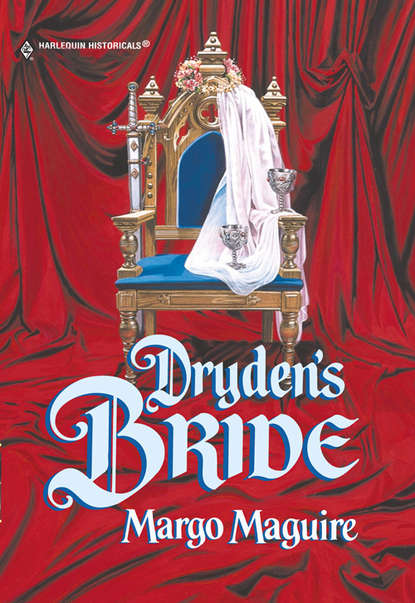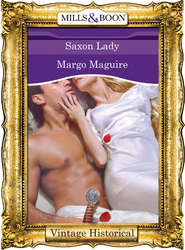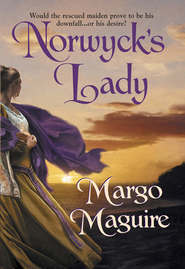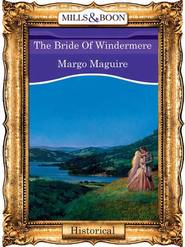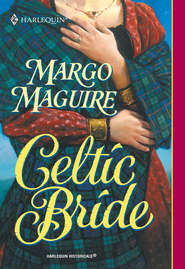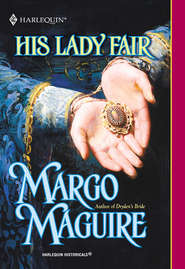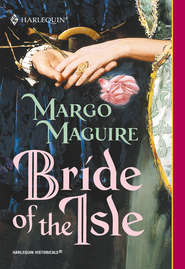По всем вопросам обращайтесь на: info@litportal.ru
(©) 2003-2024.
✖
Dryden's Bride
Настройки чтения
Размер шрифта
Высота строк
Поля
She would be a perfect wife, and Hugh decided to make his marriage proposal when they returned to the castle.
But not until after he’d seen to it that Lady Siân and the children moved themselves closer to town.
Siân desperately wished she had a few more weeks of freedom. To be allowed to sing and play with the children, to ride the horses lent her by the castle grooms, to swim in the cold waters of the lake…She lowered her eyes in resignation. All too soon, she would travel to St. Ann’s, where she would be far removed from everything familiar, from all that was dear to her.
She knew little of nunneries, only the stories she’d gleaned from different people over the years, and Siân had no reason to doubt what she’d heard. She was certain, for example, that the abbess would lock her in a “cell” every night to sleep on a narrow bed of straw. She’d heard that nuns had their hair chopped off and their bald heads covered by tight, ugly wimples that firmly bound their chin and cheeks. Siân assumed she would be compelled to wear a hot, itchy under-kirtle that would chafe her sensitive skin, and she would be required to spend hours upon hours on her knees, praying for the salvation of souls all across Britain.
But the most dreadful thing was that she would have to put all thoughts of Hugh Dryden out of her mind. Siân wasn’t sure if that was going to be possible. The man had plagued her thoughts ever since shooting the boar out from under her in the forest. He had saved her life, and she wasn’t about to forget him…or the way her heart seemed to skitter when he was near.
She shivered slightly when she recalled the way Hugh had efficiently unlaced her soaking gown that first night, then wrapped her in his own blanket. Siân had never experienced such remarkable sensations before. It was as if he had somehow reached inside her and kindled a mysterious fire within. Parts of her body became exquisitely sensitive, and he had barely even touched her.
His hands were strong, but gentle. His words curt, but not unkind. At least, he’d been kind until she’d thoughtlessly spoken of losing a limb. Clearly, he did not need her to teach him about such loss. She deserved the harsh words he’d delivered to her last night during the storm.
With a heartfelt sigh, Siân gathered the children around her and they sat together on a blanket of dry leaves under an ancient oak tree. She had to stop thinking of Hugh and truly resign herself to her fate at St. Ann’s.
Owen’s decision was final. Siân had no choice in the matter.
“In my country, there is a place called Llanfabon, where the faeries like to make mischief,” Siân said as one of the older girls sat down and began to plait her hair. Another child picked wildflowers and threaded them into Siân’s russet tresses. “And in Llanfabon, there once lived a widow woman and her small son, Pryderi.”
By telling the old tale, Siân hoped to get her wayward thoughts under control. It was no use thinking of Hugh Dryden or his heroic rescue—not only of her, but of Clairmont itself. He was remote and aloof, always so serious, Siân thought. Surely he had not been afire the night he’d gotten her out of her wet clothes. Siân knew she was not likely to inspire any sort of longing in a man.
Siân tamped down her irrational sense of defeat and continued her tale. “One day, while the widow was making her little son’s breakfast, she heard a commotion outside. The cattle were lowing down in the byre. Pryderi’s mother was afraid something was amiss.”
“What could it be?” a little girl asked.
“’Twas a wolf!” cried one of the boys.
“No…” Siân said dramatically. “Remember, there were faeries in that part of the country…”
Which started a flurry of questions about faeries and whether or not they could be seen nearby, and if ever they caused mischief among the cows and pigs at Clairmont. The children crowded around her and plied her with their queries, so preoccupied that none of them took note of the knight who’d walked up behind them.
Hugh delayed his return to Clairmont to tell Siân to move in closer to the town with the children since there could still be danger lurking in the outlying forest. He’d intended to speak to her right away, but instead, kept his silence as he approached her and the children, unwilling to put a stop to the sound of her engaging voice and her pleasing Welsh accent.
She continued her story as the children sat spellbound. “When the poor mother returned to their cottage, she was suspicious that something had changed. ‘Och, child,’ she cried, ‘you look like my sweet Pryderi, yet you are somehow different. I fear it is not really you I see before me.’
“The child, who was different, awakened. He said, ‘Of course it is I, Mother. Who else would I be?”’
One of the little girls interrupted the story. “Did the faeries take Pryderi from his mother?”
“Did they give her a changeling?” another asked.
“The poor old mother did not know for certain,” Siân replied. “But the only way she knew to find out, was to ask the wise man of the village…”
Hugh leaned his back against a tree and watched as Siân wove her magical spell for the children. She was a gifted storyteller, he thought as she changed her voice and moved her delicate hands to emphasize parts of the story. His earlier impression of Lady Siân as a faerie sprite was not too far from reality, and he found himself falling under the spell of that voice, those hands.
And as he stood there, enveloped in the enchantment of the moment, Hugh wondered how it would feel if she were to touch him. Not the competent touch of a healer to his wound, as she’d been last night, but the soft caress of a feisty red-haired woman who wept with abandon in private, and laughed without restraint in the company of children.
“…and the boy’s mother sought the counsel of the old wise man once more,” Siân continued. “‘You must perform a difficult task,’ the old man told her. ‘Search out and find a hen as black as night, whose feathers reflect no light. Close up your cottage, block the doors and windows, but leave the chimney open. Make a fire, and cook the hen over it…”’
The tale went on to its happy ending, and it wasn’t until Siân had reunited the hapless Pryderi with his mother that the children noticed Hugh in the shadows near the oak tree. They were instantly wary of the man with the black eye patch.
“’Tis Lord Alldale,” Siân said, as startled by his arrival as the children. Recovering quickly, she arose from her seat beneath the spreading oak tree. “’Twas he who saved me from the fierce boar who would have gored me with his tusks…” she grabbed the smallest boy and twirled him around as he giggled with glee “…and eaten me all up!”
Hugh warmed inexplicably as he watched Siân spin with the child, her face flushed, her skirts billowing out all around her. He cleared an odd thickness from his throat and approached the small group. “Lady Siân, it would be well for you to stay closer to the town.”
“Why, my lord?” she asked, her innocent eyes full of questions.
Hugh hesitated. He saw no reason to take the joy out of her day. “Only because…it looks as if it wants to storm again,” he finally said.
Siân looked up at the sky.
He was right. Rain was coming. She smiled warmly. It was considerate of him to come out and forewarn her.
“Vraiment, I am flattered, Lord Alldale,” Marguerite said in response to Hugh’s proposal of marriage.
And flustered, Hugh thought, although her excellent breeding was evident in her tact and poise. There was hardly any indication that she found his offer of marriage untoward. A mere flaring of nostrils, a twitch of the lips, a slight flush of color on those high cheeks…Hugh only noticed these subtle signs because he was more aware than most, after enduring so many politely averted gazes and disdainful glances.
Hugh’s face had once been a pleasing one. In those earlier days, he’d been satisfied with his lot, quick to meet a challenge or to stand for his friends. His company had been sought in battle as well as in the public house.
Though he’d never had the kind of looks that made women swoon, there had been no dearth of beauties to grace his bed in those days, he thought morosely. Not that he’d want any of the shallow and vain creatures near him now. He’d seen too many women pale and weaken at the sight of his scars and the leather eye patch. He knew their grimaces came with the mere thought of a touch from his mangled hand…and how he’d gotten it.
Marguerite sat on a comfortable chair in her solar, while Hugh remained standing, free to wander the room as he chose. He refused to be discomfited by the situation, by her reserve. He was certainly aware that he was no longer pleasant to look upon, that a beautiful woman like Marguerite would have some difficulty with the notion of spending her future shackled to a man with his disfigurements.
Hugh had adjusted. He would never again be the man he was two years ago, but he was a man, nonetheless. Strong again. Capable. Marguerite could do worse for a husband. He was no pauper, to go begging for favors of a wealthy widow! He had Alldale, a prosperous estate that belonged to him alone.
The lady took a sip of wine from a delicate silver chalice, biding a few moment’s time. She cleared her throat before speaking again.
“As you might know,” she said haltingly, “I have received two, um, additional offers of marriage.”
“I’d heard.” And didn’t particularly care. Just choose, he thought, and we can get on with it one way or another.
“My parents are dead,” Marguerite added. “I have no one close by to advise me.”
“Her Majesty, the Queen?”
“We are good friends, yes,” she replied, “but she has counseled me to write my uncle in Lyons for his advice and…perhaps his consent.”
“I see.”
“And, um, I must also request the permission of the council in London. They have certain requirements—”
“Yes, I know all about the council’s requirements,” Hugh said, standing now with his back toward Marguerite. This was impossible! Why had he ever agreed to coming to Clairmont? He turned to face her, and managed to speak calmly. “I doubt you will find any objections from that quarter, but I grant you time to make your wishes known to them.”
“Thank you, my lord,” Marguerite said timidly. “You are most generous.”
“If you do not mind,” he said, “I will remain here at Clairmont until you have made your decision.”
“It is not entirely my decis—”





